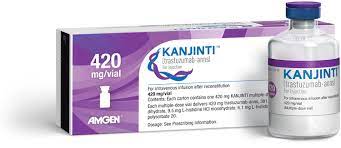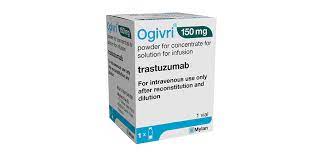- Bone Health
- Immunology
- Hematology
- Respiratory
- Dermatology
- Diabetes
- Gastroenterology
- Neurology
- Oncology
- Ophthalmology
- Rare Disease
- Rheumatology
Safety Findings Are Reported for Trastuzumab Biosimilars
Real-world evidence from Poland and Brazil confirms comparable safety for the trastuzumab biosimilars Kanjinti and Zedora in the breast and gastrointestinal cancer settings.
Real-world studies demonstrating comparable safety for trastuzumab biosimilars vs the originator (Herceptin) were presented at the ASCO 2021 Annual Meeting.
Kanjinti
Investigators in Poland said a study of patients with human epidermal growth factor receptor 2–positive (HER2+) breast cancer who switched to the trastuzumab biosimilar Kanjinti yielded safety outcomes comparable to those for Herceptin.1
“The 12-month follow-up treatment with Kanjinti [demonstrated] an acceptable cardiac safety profile. In cases where there was a switch from Herceptin to Kanjinti or Kanjinti combined with pertuzumab, the safety profile was similar to that previously reported in other studies,” investigators said.
Clinicians have been cautious about switching patients to trastuzumab biosimilars because of the paucity of real-world data for these agents, hence the value of conducting this study, investigators said in the abstract presented at ASCO.
The observational retrospective study evaluated Kanjinti therapy in patients (N = 195) with HER2+ breast cancer between July 2018 and January 2020.
Investigators said 34 patients received carboplatin, docetaxel pertuzumab, and the trastuzumab biosimilar in the neoadjuvant setting; 99 received Kanjinti as monotherapy or in combination with other cytostatic drugs in the neoadjuvant or adjuvant settings; and 62 received docetaxel, pertuzumab, and the trastuzumab biosimilar in the metastatic setting.
In this population, pertuzumab was used in conjunction with the trastuzumab biosimilar in 49% of patients (32%, first line of palliative treatment; 17%, neoadjuvant settings); 65% of patients with metastatic breast cancer switched to the biosimilar form of trastuzumab; and 37% of patients with early breast cancer switched. “Switching was done at a median of the fourth cycle.”
Investigators said 6 patients experienced a decline in left ventricular ejection faction and no other trastuzumab-related adverse events (AEs) occurred.
Zedora
In a second real-world trastuzumab biosimilar (Zedora; Mylan/Biocon) Brazilian study, predominantly evaluating patients with HER2+ breast cancer, AEs for Zedora were comparable to those associated with Herceptin.2
“The risk benefit remains consistent with the reference safety information and no new safety signals were detected,” investigators wrote.
Zedora is marketed in the United States under the brand name Ogivri and was approved for marketing in Brazil in 2017.
Investigators evaluated 74 AE reports from 73 female patients with HER2+ breast cancer and 1 male patient with gastric adenocarcinoma. Among 656 AEs identified in the reports, 588 (89.63%) were nonserious (413 expected, 175 unexpected) and 68 (10.37%) were serious (51 expected, 17 unexpected)
Among the 17 serious unexpected AEs, 13 were not related to trastuzumab therapy and 4 were related to therapy, investigators said. Among the 175 nonserious unexpected AEs, 56 were unrelated to therapy vs 119 related.
The most common AEs, according to system organ classification, were 111 (16.92%) general disorders/administration site conditions, 98 (14.93%) gastrointestinal disorders, and 88 (13.41%) nervous system disorders.
Those included diarrhea (4.11%), fatigue (3.66%), nausea (3.35%), weight decrease (2.74%), and infusion reactions (2.59%).
“The AEs noted in patients with breast cancer and gastric cancer treated with biosimilar trastuzumab were consistent with the known safety profile of trastuzumab,” investigators said. Earlier findings from the study were reported at ASCO annual meetings in 2019 and 2020.
References
1. Jagiello-Gruszfeld AI, Lemanska I, Brewczynska E, et al. Trastuzumab biosimilar (Kanjinti) in breast cancer patients: one-center retrospective observational study. Presented at: ASCO 2021: June 3-7, 2021. Abstract e13015.
2. Monteiro da Silva A, Watanabe TTWO, Honda E, Yamaguchi J. Biosimilar trastuzumab active post marketing surveillance real world 2020 data update: results from a patient support program for patients under treatment with the first biosimilar trastuzumab approved in Brazil. Presented at: ASCO 2021: June 3-7, 2021. Abstract e14504.
Newsletter
Where clinical, regulatory, and economic perspectives converge—sign up for Center for Biosimilars® emails to get expert insights on emerging treatment paradigms, biosimilar policy, and real-world outcomes that shape patient care.


